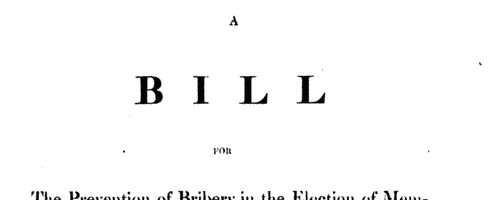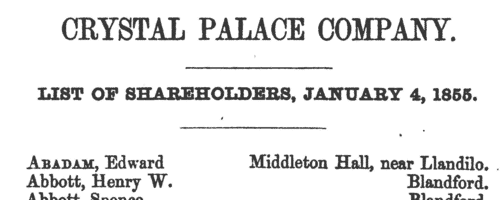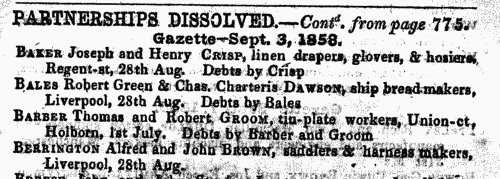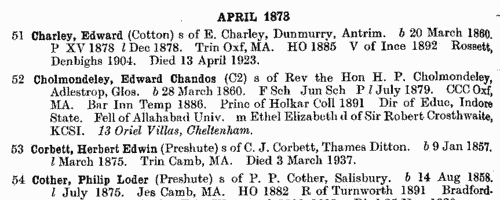Add this eBook to your basket to receive access to all 143 records. Our indexes include entries for the spelling everingham. In the period you have requested, we have the following 143 records (displaying 111 to 120): These sample scans are from the original record. You will get scans of the full pages or articles where the surname you searched for has been found. Your web browser may prevent the sample windows from opening; in this case please change your browser settings to allow pop-up windows from this site. Traders and professionals in London
(1851)
The Post Office London Directory for 1851 includes this 'Commercial and Professional Directory', recording about 80,000 individuals. | Sample scan, click to enlarge

| Inhabitants of Leeds, Yorkshire
(1853)
William White's directory lists traders, farmers and private residents in the area. | Sample scan, click to enlarge

| Bribed in Hull
(1854)
A Bill for the Prevention of Bribery in the Election of Members to serve in Parliament for the Borough of Kingston-upon-Hull, passed 11 April 1854, stated that a commission of inquiry 30 August 1853 had found that over a hundred voters were bribed at one or more of the elections for the borough in 1841, 1847 and 1852: the names of those bribed, and those who gave the bribes, were listed in the bill, and all those persons were disqualified from any future parliamentary elections for the borough. | Sample scan, click to enlarge

| Crystal Palace Company Shareholders
(1856)
The management of the Crystal Palace, built for the Great Exhibition of 1851, was restructured by a Deed of Settlement in 1852, and then incorporated as the Crystal Palace Company by royal charter in January 1853. This alphabetical list of shareholders was published in January 1856. | Sample scan, click to enlarge

| Gentry in London
(1856)
The Post Office London Directory for 1856 includes this 'Court Directory', listing alphabetically by surname and christian name the upper class residents of the capital with their postal addresses. 'In order to afford space for the addresses, the abbreviation "esq." for esquire has no longer been appended to each name in the Court Directory. It should be understood that such should be added to the name of every gentleman in the following pages to which no inconsistent addition is affixed.' Decorations, honours &c. are generally given. Some gentlemen appear who are also listed (as professional men, &c.) in the commercial section. Those with second residences in the provinces usually have the country address given as well. | Sample scan, click to enlarge

| Traders and professionals in London
(1856)
The Post Office London Directory for 1856 includes this 'Commercial and Professional Directory', recording over 100,000 individuals. | Sample scan, click to enlarge

| Insolvents
(1857)
Insolvency notices for England and Wales: insolvency often caused people to restart their lives elsewhere, so these are an important source for lost links | Sample scan, click to enlarge

| Dissolutions of partnerships in England and Wales
(1858)
Perry's Bankrupt and Insolvent Gazette, issued monthly, included lists of dissolutions of partnerships gazetted in England and Wales. The names of the partners are given in full, surnames in capitals, followed by trade and address, and date of the end of the partnership. Each entry usually ends with the phrase 'Debts by ...', indicating which partner intended to continue, and resume the responsibilities of, the business. This is the index to the names of the partners, from the issues from January to December 1858. | Sample scan, click to enlarge

| Carpenters Excluded from the Union: Beverley
(1865)
Each annual report of the Amalgamated Society of Carpenters and Joiners included a list of excluded members, arranged by branch. The great majority of the exclusions were for non-payment of entrance money or arrears, but other reasons are cited from time to time - fraud; bringing the society into discredit; dishonesty; entering the society under false pretences; working contrary to the society's interest; not being a competent workman. In most cases names are given in full.
| Sample scan, click to enlarge

| Boys entering Marlborough College
(1872)
The public school at Marlborough in Wiltshire was founded in 1843. In 1952 this, 9th, edition of the college register was published, being a revision by L. Warwick James of the 8th edition (of 1936): but for the years before 1936 it does not merely repeat the 8th edition, because Warwick James was able to correct the 19th-century entries with information from newly-discovered letters and books from 1843 to 1853, and the school lists from 1844 onwards. The roll is arranged by year, and within each year by term of entrance, and then alphabetically by surname within each term. Each boy is assigned a number within the year: then his name is given, surname first, and, in brackets, his house. The houses within the college were called B1, B2, B3, C1, C2 and C3, and the Lower School (L Sch); the out college houses were Preshute, Priory, Cotton, Hermitage, Littlefield, Barton Hill, Summerfield and Upcot. Then there is given the boy's father's name (surname and initials) and address (at entrance), the boy's date of birth (b) and month of leaving (l). Where the boy represented the school at Rugby football (XV) or cricket (XI), in the rifle corps (VIII, or RC XI), that is indicated. There is a brief summary of achievements in later life, and, where known, and date of death or (in italics) address as in 1952. | Sample scan, click to enlarge

|
Research your ancestry, family history, genealogy and one-name study by direct access to original records and archives indexed by surname.
|











